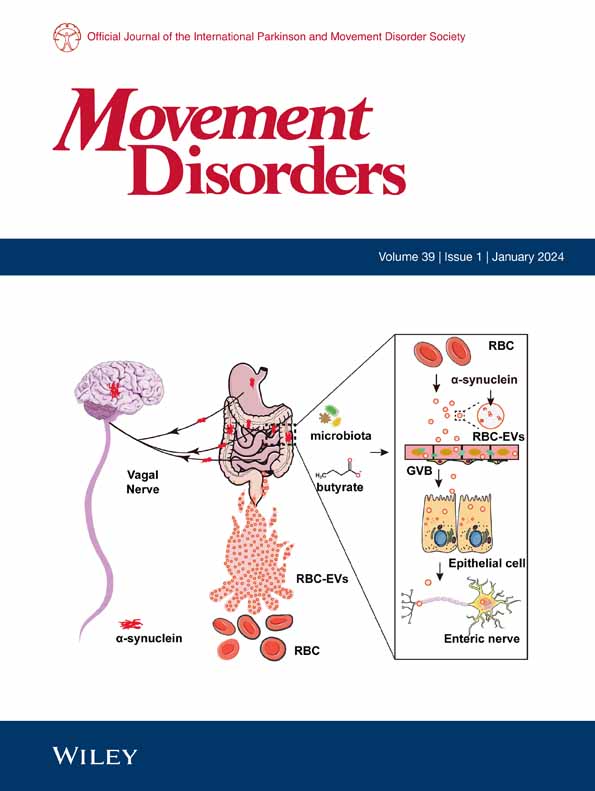血浆代谢组学在帕金森病前驱期和临床中的应用
IF 7.6
1区 医学
Q1 CLINICAL NEUROLOGY
引用次数: 0
摘要
背景:帕金森病(PD)漫长的前驱期以及该疾病与代谢因素的联系表明,代谢组学可以帮助在早期阶段识别受影响的个体。目的:研究血浆代谢组学谱是否可以识别PD前驱期和临床期的个体。方法:我们量化并比较922名PD患者的血浆代谢组学特征,这些患者在疾病诊断前11年(n = 809)或诊断后2年(n = 113)提供血液样本,并与匹配的对照组进行比较,这些样本均来自三个已建立的队列研究(护士健康研究、卫生专业人员随访研究和癌症预防研究II)。我们使用条件逻辑回归模型和机器学习技术来识别预测前驱和临床表现PD的代谢物。结果几种代谢物,特别是氨基酸、酰基肉碱和其他脂质,从疾病诊断开始就与PD有名义上的联系。代谢物被认为是食物或护理产品的生物标志物,往往与疾病诊断时更高的PD风险相关。代谢产物反映了咖啡、吸烟和对乙酰氨基酚的高摄入量往往与疾病过程中较低的PD风险相关。前驱样本的代谢组学特征不能准确预测未来的临床PD。结论PD的进展可能与氨基酸和脂质代谢相关的代谢途径有关。代谢组学差异也可能是行为改变和医疗管理的结果,强调在未来的研究中需要考虑前驱和临床数据。©2025国际帕金森和运动障碍学会。本文章由计算机程序翻译,如有差异,请以英文原文为准。
Plasma Metabolomics Profiles in Prodromal and Clinical Parkinson's Disease.
BACKGROUND
The long prodromal phase of Parkinson's disease (PD) and the link the disease has with metabolic factors suggest that metabolomics could help identify affected individuals at early stages.
OBJECTIVE
The goal was to examine whether plasma metabolomic profiles could identify individuals in the prodromal and clinical phase of PD.
METHODS
We quantified and compared the plasma metabolomic profiles of 922 individuals with PD who provided blood samples at a median of 11 years before (n = 809) or 2 years after (n = 113) disease diagnosis to that of matched controls, all selected from three established cohort studies (Nurses' Health Study, Health Professionals Follow-up Study, and Cancer Prevention Study II). We used conditional logistic regression models and machine learning techniques to identify metabolites predicting prodromal and clinically manifest PD.
RESULTS
Several metabolites, especially amino acids, acyl-carnitines, and other lipids were nominally associated with PD since the years leading to disease diagnosis. Metabolites proposed as biomarkers of foods or care products tended to be associated with a higher PD risk closer to disease diagnosis. Metabolites reflecting higher intake of coffee, smoking, and acetaminophen tended to be associated with a lower PD risk over the course of the disease. Metabolomic profiles in prodromal samples were unable to accurately predict future clinical PD.
CONCLUSIONS
Metabolic pathways related to the metabolism of amino acids and lipids may be involved in PD progression. Metabolomic differences may also result from behavioral changes and medical management, emphasizing the need to consider prodromal and clinical data in future studies. © 2025 International Parkinson and Movement Disorder Society.
求助全文
通过发布文献求助,成功后即可免费获取论文全文。
去求助
来源期刊

Movement Disorders
医学-临床神经学
CiteScore
13.30
自引率
8.10%
发文量
371
审稿时长
12 months
期刊介绍:
Movement Disorders publishes a variety of content types including Reviews, Viewpoints, Full Length Articles, Historical Reports, Brief Reports, and Letters. The journal considers original manuscripts on topics related to the diagnosis, therapeutics, pharmacology, biochemistry, physiology, etiology, genetics, and epidemiology of movement disorders. Appropriate topics include Parkinsonism, Chorea, Tremors, Dystonia, Myoclonus, Tics, Tardive Dyskinesia, Spasticity, and Ataxia.
 求助内容:
求助内容: 应助结果提醒方式:
应助结果提醒方式:


